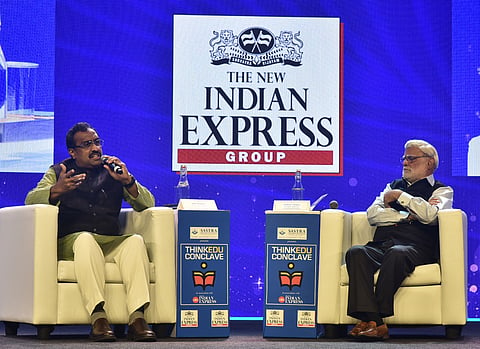

CHENNAI: Our nation can be identified both as India and Bharat. True secularism, in the Indian context, involves equal respect, no discrimination, and no preferential treatment based on religion, Ram Madhav, author, and thinker, said during a discussion on "Bharat and Hindutva: How Far Do They Go?" at the 13th ThinkEdu Conclave 2024, presented by SASTRA University, in Chennai on Wednesday.
Responding to a question by the chair Prabhu Chawla, Editorial Director, The New Indian Express, about the recent emphasis on the term 'Bharat', especially before the elections and on the G20 platform, Madhav clarified that it was not driven by political convenience.
"Our decision to highlight the core identity of our nation, Bharat, at the G20 was a strategic move. With the leaders assembled there representing 80% of the world's economy, it provided an excellent opportunity to emphasize our civilizational and cultural roots. In G20 literature, the terms 'India' and 'Bharat' were interchangeably utilised, showcasing our pride in our heritage and referring to our nation as Bharat or Bharathiya as deemed appropriate."
He further asserted that the names India and Bharat can be used interchangeably. "There's no need to pit Bharat against India, as Bharat, Hinduism, and India are all synonymous with our existence. The country is identified at various levels with these words, and a historical debate ensued over what our nation should be called. The drafting committee proposed 'India,' but 'Bharat' also holds significance in defining our collective identity."
Addressing concerns about changing the names of laws and the perception of India as a secular country, Madhav asserted that Bharat has always been secular. He emphasised the constitutional commitment to secularism and added, "In Bharatiya tradition, equal respect should be given to all."
Prabhu Chawla asked, "You've modified the name of the penal laws in English, and introduced a Sanskritised version in Hindi. India is widely perceived as a secular country, and Hindutva doesn't seem to align with that perception, despite an 80% Hindu population. Are you attempting to dispel the impression that India is no longer a secular nation?"
To this, Madhav responded, "Bharat has always been inherently secular. The concept of India being a secular country is enshrined in our constitution. Therefore, I assert that it will genuinely remain a secular nation. In the Bharatiya tradition, as well as our country's tradition, we believe in according equal respect to all."
When questioned about the construction of the Ram Mandir, Madhav clarified that it was not a political move but a result of the sacrifices of millions of Hindus and 1.4 billion Indians.
He highlighted the people's involvement in contributing funds for the temple, drawing parallels with the reconstruction of the Somnath temple, where Mahatma Gandhi had advised collecting funds from the public rather than using government money. He emphasised that the construction of the Ram Mandir was not then an attempt at politicisation but a reflection of the people's sentiments and devotion.